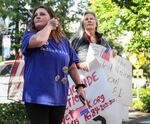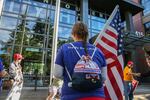Picketing outside the homes of Vancouver employees and elected officials is poised to become illegal, despite testimony from opponents who called the move unconstitutional.
On Monday, Vancouver City Council prohibited what it calls “targeted picketing or protesting.” The decision follows several recent protests — mainly against measures to quell COVID-19 — outside homes and schools in Clark County.
At least 50 people filled City Council chambers for a public hearing. While many who signed up to speak defended the tactics, councilors cruised to a unanimous passage.
“It’s incumbent upon us … to protect our staff members and to protect the public that we serve from this kind of speech,” Councilor Erik Paulsen said before the vote.

Ryan Olski, left, protests outside Vancouver City Hall against a proposed ordinance to ban "targeted picketing,” on June 6, 2022. Vancouver City Council unanimously passed the ordinance that evening.
Troy Brynelson / OPB
The move comes after multiple protests.
The most prominent case occurred July 2020 after Vancouver charged a pet groomer with violating Washington state’s stay-at-home orders during the pandemic’s first wave. Opponents of the orders, led by far-right group Patriot Prayer, responded by parading outside the homes of two city attorneys.
In September 2021, groups that included Patriot Prayer and the Proud Boys, rallied outside the home of Superior Court Judge Suzan Clark after the judge banned “disruptive” anti-mask demonstrations on Vancouver School District property. One such protest put three schools into lockdown after witnesses said Proud Boys attempted to escort a maskless student into a school.
The protests have occurred outside Vancouver as well. In September 2021, then-Battle Ground Mayor Adrian Cortes saw “dozens of people” descend on his home after he resisted a so-called “medical freedom” ordinance that would have prohibited vaccine mandates for city employees, according to The Reflector newspaper.

Opponents to a city of Vancouver proposal to ban "targeted picketing" stand outside City Hall on June 6, 2022. The ordinance passed unanimously that evening.
Troy Brynelson / OPB
Councilor Kim Harless, who said her past as an activist and protestor made her initially concerned about the city ban, described the recent protests as closer to bullying than exercising free speech.
“It does not violate the First Amendment, something that I’m very passionate about for our community and for change,” Harless said.
Opponents made several arguments, but mainly said the prohibition trampled on free speech. Vancouver resident Wynn Grcich said the move would ripple outside of the city.
“What you’re doing in this City Council tonight is going to affect other cities everywhere else,” Grcich said. “And it’s really terrible because they do have the right to protest as a constitutional right.”
Choosing where to protest
Protests targeting public officials at their homes have become increasingly popular as a tactic in recent years. City leaders in nearby Portland have seen protests at their homes or while out to eat at restaurants, and recently Supreme Court Justice Brett Kavanaugh had picketers outside his home following a leaked draft of the court’s pending decision on abortion access.
Vancouver attorneys contend banning targeted picketing is constitutional, so long as the ordinance is neutral about a protests’ mission and still allows picketers to get out their message in other ways.
In a March 31 memo, Chief Assistant City Attorney Nena Cook cited a 1988 ruling by the U.S. Supreme Court that sided with the town of Brookfield, Wisconsin, that forbid picketing outside a person’s home.
“The type of picketers banned by the ordinance generally do not seek to disseminate a message to the general public, but to intrude upon the targeted resident, and to do so in an especially offensive way,” the court wrote. “Even if some such picketers have a broader communicative purpose, their activity nonetheless inherently and offensively intrudes on residential privacy.”
The prohibition is, in effect, three revisions packaged together. It tweaks city laws on noise, pedestrian safety and the city’s power to defend its employees in legal matters arising in the course of their jobs. The prohibition only applies in residential areas.
Ariel Fitzpatrick, who was married to one of the Vancouver city attorneys at the time of the protests around their home, helped craft the ordinance with city Councilor Sarah Fox.
On Monday night, Fitzpatrick thanked the council while wearing a yellow ribbon to signify stalking awareness. Fitzpatrick said protestors, who returned to their home multiple times, qualified as stalkers.
The prohibition will “protect other community members in Vancouver from experiencing what me and my neighbors went through,” Fitzpatrick said. “If someone chooses to make the city of Vancouver their home, and I hope they do, they have a reasonable right to peace, privacy and solitude.”